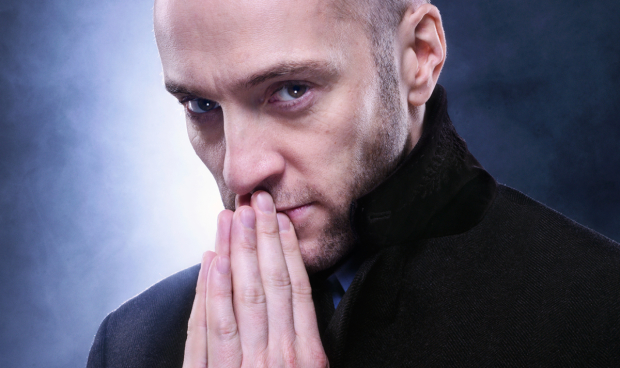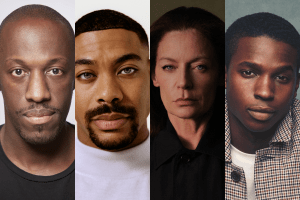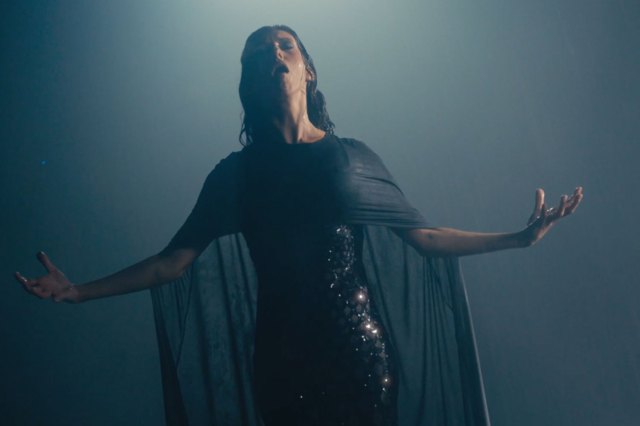Derren Brown: 'I'm only human'
Ahead of his latest show hitting the West End, we met with the illusionist to find out more about the inspiration behind his latest project

Best known for his television career which includes programmes Mind Control and Trick of the Mind, Derren Brown is an illusionist who has redefined the genre of magic for a modern audience.
Through his TV specials he has played Russian Roulette on live TV, successfully predicted the National Lottery result and convinced a group of strangers to commit armed robbery.
His previous hit stage shows include Infamous, Svengali and Enigma. Following a UK tour, his new show Miracle opens at the Palace Theatre, London on 17 November.
What should we expect from Miracle?
It’s a show about the audience. It’s a rollercoaster of adrenaline and fun, sometimes it’s dark and scary but it’s something that I hope could have a real impact on people's life. It comes from a place of wanting it to really mean something to people. At it’s best it can offer that, but I think it’s just a really fun night out… Can you tell I hate blowing my own trumpet?
Does it have a theme?
More than previous productions, it is philosophically driven. I’ve been writing a book on happiness for a while and some of that has fed into this. So there is a thread of taking ownership of the stories in our lives and what we tell ourselves about who we are. When we have problems in life, things that make us anxious, they tend to either come from reliving things in the past or fearing things that are yet to happen, but most of the time if we ask ourselves if we have a problem right now, we don’t.
Is it still just entertainment, or is there something bigger there?
The context of my previous projects has been born out of wanting to find something that works theatrically. Although that’s very important and something I’ve had to retain in Miracle, from the ground up this time has been more about things I find important and would like to say.
My TV programmes have often been controversial, but if that’s your starting point you end up hitting all the wrong notes, it has to come from somewhere. The only way of sustaining a career in magic over 15 years is to have an agenda that is outside of ‘Hey look at me, aren’t I great’.
In terms of making sure things work – there are some things that I know mechanically will absolutely work, like the finale, it HAS to work, you can’t rely on a method that could go to pot if someone is being difficult. Other bits really are quite loose, sometimes things don’t work and that’s kind of fine, it doesn’t matter, the same as if you see a juggler drop a ball – it reminds you that they are human, reminds the audience what you are doing is difficult.
Is it important that the audience see you as human rather than 'an illusionist'?
Yes. I feel this a lot watching performers, especially with magicians because they get very carried away with themselves. That human connection is always key, if you don’t hit that it won’t resonate with people.
I remember one performance, people were calling things out and I was writing them down on an easel, and I couldn’t get the cap off the marker. In a review the journalist said about how I do this thing where I pretend to get the marker lid off and how it was a very clever thing to do to make me look more human – it was a genuine mistake that went on for far too long, but I learnt a valuable lesson from that.
Do you notice a difference between audiences as you tour around the UK?
Definitely. There’s cities where you’ve got a very strong sense of community, which always have a real energy about them. If that happens to combine with a theatre where the physical architecture means you can hear them it can be amazing. I played the Bristol Hippodrome a couple of years ago and there was a note on the mirror from Dara Ó Briain saying ‘Welcome to the best audience in the country’. I’ve spent a long time in Bristol so it’s like going home, but they are amazing, it’s a bright, sassy, creative audience. Edinburgh’s the same.
Is it important to you to take your shows around the UK?
Yeah certainly. You sort of naturally end up at theatres that are large enough, so there’s some pockets of the country that don’t get to see it, which is a shame. But the flipside of that is that it brings audiences in that don’t regularly go to the theatre, a comedy audience or TV audience – which sometimes means you’ve got people sitting there eating a pizza or something, but it’s lovely to hear from theatres that we've brought a whole new crowd in.
Tickets for Miracle are relatively low compared to other West End productions. What’s the secret?
I suspect that because it’s a one-man show they get to keep the overheads down. It’s important to me that it's affordable, but whatever the price people are always going to complain on Twitter that they are too expensive. Unfortunately, it’s just expensive to go the theatre these days, but if you go to Broadway it’s twice as much. Maybe I should have a word with the producers, clearly I’m missing a trick…
You’ve got a ride opening at Thorpe Park, how did that come about?
They got in touch three years ago to ask if I’d like to do something for them. It was total carte blanche, which was of course phenomenal to be asked. It’s been three years of writing and creating this thing with a group of people that are just big kids. It’s lovely, everyone’s purely about the ultimate experience for the patrons which, for me, is totally my world. It’s their biggest investment to date, which is hilarious because it’s just me sat in my front room shouting ‘Let’s do this!’. It’s not like a rollercoaster, it’s an attraction, the first of it’s kind in the world, they’re not saying anything about it at the moment but apparently it’s going to be the future of theme park attractions.
Miracle opens at the Palace Theatre on 17 November. Click here for more information and to book tickets.












